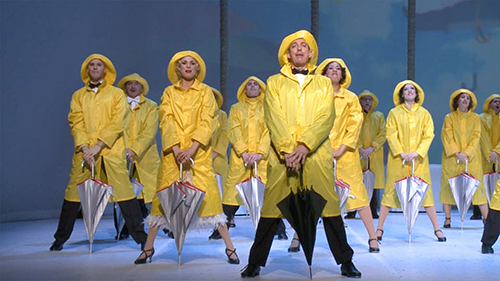Feb 19 2016 Singing in the rain
By Frank Weil, Chairman of The Intersector Project
 What does singing have to do with good governance?
What does singing have to do with good governance?
Robert Putnam, the influential Harvard political scientist, asked himself that very same question when studying regional Italian governments in the 1970s. During his investigations, he discovered that the number of choral societies in a region correlated closely with the region’s quality of governance.
What is it about singers that could so dramatically improve the quality of life in their communities?
It turns out that all kinds of folks love to sing. The members of these choral societies had very little in common other than their one shared interest: they were men and women, executives and plumbers, teachers and police officers. They were parents and newlyweds, athletes and intellectuals, communists and libertarians.
Eventually, Putnam discovered that it was not just choral societies that seemed to improve life in their towns, but also soccer teams, literary clubs, and community service organizations.
Ultimately, Putnam realized that it was not the singing that made a difference. It was the fact that after these people came together to sing, or whatever they were up to, they would gather over wine to gossip about local issues AND form important, trusting relationships with people whom they probably never would have otherwise met. Thus, when problems arose in their communities, lines of communication were already in place to facilitate finding solutions.
Today in America, a core problem is that those kinds of relationships are too infrequently formed. A lot of people avoid opportunities to meet strangers in a social environment, instead depending on a loose network of “friends” and followers on social media. With the absence of real, old-fashioned face-to-face relationships, it should be no surprise that our fractured society has become so untrusting and non-functional.
Therefore it stands to reason that perhaps we should be trying harder today in America to encourage and enable many more such face to face relationships.
The HOW is daunting: clearly there is not any one thing that will reverse decades of adverse social change overnight, but getting more people aware of the issue would be a good start.
Then these individuals might begin to reach out to strangers and discover new ways to get to know and trust more people.
We do have bowling leagues, little leagues, and many more such opportunities BUT because of the dratted internet, too many people rush away from their real life groups to twitter away their valuable time and selves. They need to slow down and hang out with actual folks and get to know them better.
Perhaps some people, when they “get it” might even try to get other folks to also get it.
Ironically, some folks might be inspired to spread the word about face-to-face interaction via Facebook or Twitter. Though those connections lack many elements of offline interaction, social medial enables ideas to go viral, dramatically increasing their exposure.
It is true that love and trust cannot be commanded, but perhaps we can do more to create the conditions out of which they can arise.
Singing in the shower and rain is cool. Helping make things happen is even cooler!
